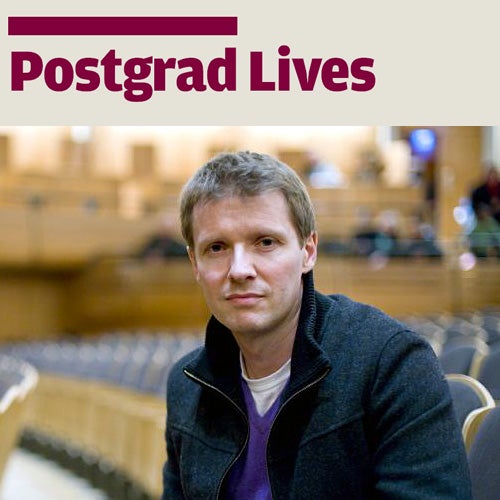Postgrad lives: ‘I’ve learnt a lot of practical things about putting on opera’

Julian Philips, 40, is nearing the end of a DPhil in music at the University of Sussex, a key part of which has been a position as composer-in-residence at Glyndebourne.
How did you come to land this post?
It was an advertised position, and I had to go to interviews at Glyndebourne and the university, and submit a portfolio of composition. It came when I was developing a freelance working path – among other things teaching at the Guildhall School of Music and Drama – that allowed me to do more composing.
What’s your academic background?
My first degree was a BMus at the University of Cambridge, which I finished in 1990. After that, I muddled along for a long time, including a period working for a music agency, looking after opera singers, booking their plane fares, negotiating fees and generally promoting them.
In what way has the DPhil included research?
My research question has amounted to this: what is opera and where is the art form going? It’s a bit like being asked to discover what the word “opera” means to me, and working out what my aesthetic position on opera is.
What does your dissertation consist of?
In terms of what I submit for my DPhil, there are two pieces. The main piece, premiered at Glyndebourne, was called Yellow Sofa. It’s a chamber opera for 10 singers and a small orchestra based on a Portuguese short story. The other piece, called Followers, is for three singers and four musicians, and specifically designed to be performed in different locations around the Glyndebourne site. A community opera I wrote, called Knight Crew, which is quite gritty and urban, and which was performed at Glyndebourne in March, is something that grew out of the residency.
How have you spent your time?
I’ve flitted between home – where it’s better to get on with composing – and Glyndebourne, where I can move around the company and see how it works, and have also spent some time at the university, which is close to Glyndebourne.
Have you enjoyed it?
It’s been amazing. For any composer, a residency is a tremendous opportunity, because it gives you stability to think and work in one area. Without question, it’s been formative in my development as a composer, and I’ve learnt a lot of practical things about putting on opera.
What stage are you at now?
I’m due to finish at the end of this academic year, and am currently in my write-up period, where I’m pulling out the narrative of how the pieces were written, and how they were developed in the studio. That process felt very much like research.
How did you fund it?
I got a grant from the Arts and Humanities Research Council, which paid my university fees and also included a maintenance grant.
What next?
I’m not sure. I have a couple of non-operatic things to do, but longer term I definitely want to stay with opera.
Subscribe to Independent Premium to bookmark this article
Want to bookmark your favourite articles and stories to read or reference later? Start your Independent Premium subscription today.

Join our commenting forum
Join thought-provoking conversations, follow other Independent readers and see their replies